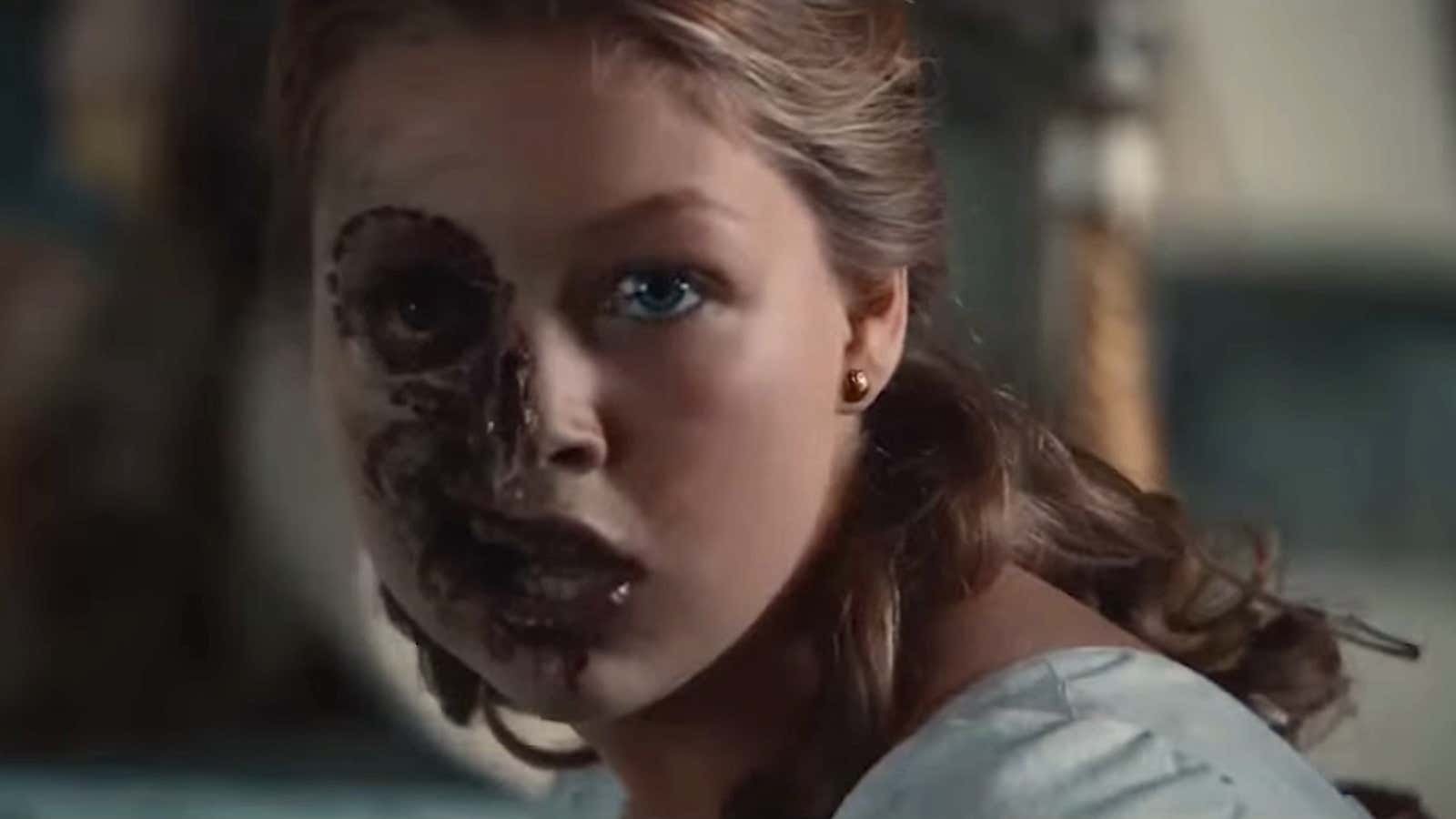It is a truth universally acknowledged that a female character lacking sufficient strength must be in want of edged weapons and gobs of firepower.
That at least is the assumption of Pride and Prejudice and Zombies. The film, based on the mash-up novel by Seth Grahame-Smith, gleefully takes Jane Austen’s blueprint and adds heroines with swords, knives, and kick-ass martial arts skills, the better to decapitate, mutilate, and generally slay hordes of the undead. Austen’s women were at the mercy of patriarchal inheritance laws and the vicissitudes of their suitors. Now, suddenly, they are “Strong Female Character,” alternating tea with kickboxing and trapping those suitors in deadly leg locks when they get too forward. The juxtaposition of proper manners and gouts of zombie bits is a delightful concept—though it can also leave Austen’s wonderful female characters looking a bit decrepit.
Obviously, the main upside here is the giggles, but there are other satisfactions as well. In Austen’s novel, shy elder sister Jane Bennett is nearly smothered with within a cloak of retiring goodness. It’s fun to see her break out of her shell and hack a few zombies to pieces.
In other respects though, the embrace of strong female characters actually makes the female characters…well, less strong. In the novel, Elizabeth’s friend Charlotte Lucas is clear-eyed, practical, and a quiet voice of uncomfortable wisdom. “Happiness in marriage is entirely a matter of chance,” she notes soberly. With neither money nor beauty, she makes the best marriage she can financially, wedding the foolish and obsequious Mr. Collins with her eyes wide open.
The fact that she manages to make that marriage happy enough (in part by encouraging Mr. Collins to spend time in the garden as often as possible) is a small triumph against constrained circumstances. And it’s a triumph the film completely erases. In a world where women are fully self-actualized zombie hunters, Charlotte’s considered compromises make no sense. From an intelligent woman faced with difficult choices, she is transformed into a vaguely ridiculous nonentity.
Nor is it only Charlotte who is marginalized. Turning the cast into strong female characters oddly means that they are, proportionally, less central to the story. Pride and Prejudice is about a woman’s world of balls, marriage proposals, and conversations—men show up as outsiders, intruding on a women’s world.
In Pride and Prejudice and Zombies, though, the central storyline is the zombie war, which means that martial machinations and the work of battle become the main driver of the plot. That’s an iconically male narrative, and, sure enough, the men take up a lot of screen time.
The film opens with Darcy (Sam Riley) investigating a zombie infestation at a whist party, dashingly introducing himself as “Darcy. Colonel Darcy” a la James Bond. The nefarious Wickham (Jack Huston) meanwhile has his role increased from a small scale cad—whose iniquities are mostly related second hand—to a supervillain. Wickham’s machinations chew steadily, if confusedly, through the film’s hindbrain, lasting all the way through to the final frame.
The Bennett sisters get to perform feats of derring-do as well; the film is careful to make sure that Elizabeth (Lily James) and Jane (Bella Heathcote) get to save their respective loves. But characters like Miss Bingley, whose passive-aggressive machinations central to the novel, barely register in the film, while foolish sister Lydia (Ellie Bamber), is no longer “untamed, unabashed, wild, noisy and fearless.” Instead she’s demoted to a standard damsel in distress.
Even Elizabeth herself, for all her swordsmanship, loses a lot in the transition to the zombie apocalypse. In the novel, Lizzie is both witty and self-aware, able to laugh at herself for her vanity when Darcy calls her plain, and to laugh at Darcy for his pride, both to others and to his face.
On film, though, the humor can’t survive the standard rebellious female trope. When Darcy slights her, she is distraught rather than amused. She mocks his pretensions by demonstrating her superior knowledge of Chinese and “The Art of War” rather than by telling him, as she does in the novel, “I am perfectly convinced…that Mr. Darcy has no defect. He owns it himself without disguise.” In the film, she one-ups him in a manly pissing match. In the novel, she makes fun of the pissing match itself.
Gazing at Elizabeth in wonder after she has dispatched a zombie, film Darcy declares “her arms are surprisingly muscular, yet not such as to render her unfeminine.” That’s a succinct summation of the film’s good-natured goal: to balance the feminine love story of the novel with hack-and-slash action and exploding zombie bits.
Unfortunately, these two ambitions don’t match up. Fully empowered warrior women are all fully empowered warrior women in more or less the same way. In the novel, Charlotte, Lizzie, Jane, Lydia, and the others, are not heroic or triumphant. They’re smaller stature gives them room to live with and within their limits and weaknesses, rather than simply vaulting over them. They are believable, funny, sad, smart, stupid, often frustrating, occasionally admirable people.
Yes, it’s fun to see proper English ladies decapitate the undead. But those familiar with Austen’s original are likely to come away from the theater feeling that Pride and Prejudice loses rather than gains when you add some zombies to it.
